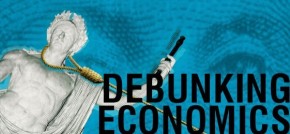Subscribe to The Zero Hour with RJ Eskow for more: https://www.patreon.com/thezerohour If you liked this clip of The Zero Hour with RJ Eskow, please share it with your friends... and hit that "like" button! Some of the music bumpers featuring Lettuce, http://lettucefunk.com.
Read More »RWER issue no. 97
download whole issue Has economics become a new theology? 2Andri W. Stahel Beyond dollar creditocracy: A geopolitical economy 20Radhika Desai and Michael Hudson A black-swan shock exposes the deep fissures, endemic imbalances, and structural weaknesses of the U.S. economy 40John Komlos Fuck the market 62Terry Hathaway The ritual of capitalization 78Blair Fix Economic hypocrisies in the pandemic age 96Raphael Sassower The politics...
Read More »Welcome from Dr. Donald Baker, Dean of Hospitality and Tourism programs I Niagara College – Toronto
Welcome to Niagara College - Toronto. This week, we interviewed Dr. Donald Baker, Dean of Business and Hospitality for the Niagara College - Toronto Programs. Dr. Baker has been involved in higher education for at least 60 years and he is extremely excited by the partnership between the Toronto School of Management and Niagara College. Dr. Baker said, "This partnership is an innovative way to bring people into the country. International students can earn a Canadian educational...
Read More »Revealed preference theory — an empty tautology
from Lars Syll The experiment reported here was designed to reflect the fact that revealed preference theory is concerned with hypothetical choices rather than actual choices over time. In contrast to earlier experimental studies, the possibility that the different choices are made under different preference patterns can almost be ruled out. We find a considerable number of violations of the revealed preference axioms, which contradicts the neoclassical theory of the consumer maximising...
Read More »Carbon markets: another frontier for finance
from C. P. Chandrasekhar Carbon prices in the European Union (EU), or the value of one unit of an EU allowance (EUA) that gives the holder the right to emit one tonne of carbon dioxide (or its equivalent of other greenhouse gasses), are soaring. From 33.69 euros per tonne at the beginning of the year, the prices of EUAs traded through the EU’s emission trading system (ETS) had risen to a high of 62.75 euros on September 9, or by more than 80 per cent. Since the ETS was created to generate...
Read More »Welcome Dean Baker
Meet Rhodes' new Assistant Principal, Mrs. Christine Baker!
Read More »Evil doers: the pharmaceutical industry and the pandemic
from Dean Baker Now that George W. Bush is back in the news with his attacks on the Trumpist insurrectionists, it might be worth reviving one of the great lines of his presidency. After the September 11th attack, when Bush decided to go after not just the terrorists who planned the hijackings, but all sorts of people around the world he didn’t like, he lumped them together as “evil doers.” That may not be the most eloquent phrase, but it works well as a description of the modern...
Read More »Is it a bubble?
Econometrics — a second-best explanatory practice
from Lars Syll Consider two elections, A and B. For each of them, identify the events that cause a given percentage of voters to turn out. Once we have thus explained the turnout in election A and the turnout in election B, the explanation of the difference (if any) follows automatically, as a by-product. As a bonus, we might be able to explain whether identical turnouts in A and B are accidental, that is, due to differences that exactly offset each other, or not. In practice, this...
Read More »Weekend read – Neoliberalism must die because it does not serve humanity
from Nikolaos Karagiannis and RWER This short article on neoliberalism comprises three brief sections which discuss key theoretical notions, general practical issues, and worldwide experiences respectively while offering a facts-based assessment. Brief concluding remarks end the article. Theory Neoliberalism gained momentum in the 1980s and became distinct and recognizable as an ideology by the 1990s as the “Washington Consensus”.[1] Neoliberal theorists would suggest that their theories...
Read More » Real-World Economics Review
Real-World Economics Review






